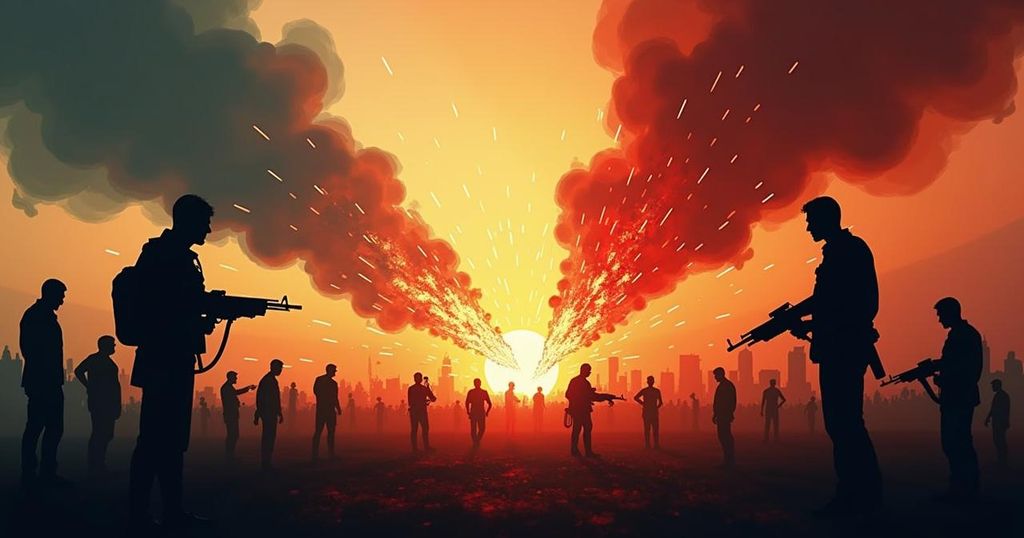Escalating Tensions: The Risk of War Between Israel and Iran
Israel and Iran are on the brink of intensified military conflict, following a significant missile attack by Iran targeting Israeli military sites as retaliation for assassinations of key figures linked to Iranian interests. While most missiles were intercepted, some reached their targets, resulting in limited damage. This escalation reflects Iran’s pushback against perceived Israeli aggression and may lead to profound regional repercussions. The absence of communication between the two nations heightens the risk of further hostilities.
Recent developments indicate an alarming escalation in tensions between Israel and Iran, positioning both nations perilously close to open conflict. In a bold military operation, the Iranian Revolutionary Guard Corps, accompanied by the Iranian army, launched approximately 180 missiles targeted at Israeli sites, including air force bases and the Mossad headquarters. This aggressive action is viewed as direct retaliation for targeted assassinations of notable figures linked to Iranian interests, including Hassan Nasrallah and leaders of Hamas based in Gaza. Although most projectiles were intercepted through a strategic collaboration involving the United States and Jordan, several did find their marks on both military installations and civilian areas, inflicting limited damage and few casualties. Nonetheless, this incident marks a significant escalation compared to previous engagements, indicating a troubling trend toward direct warfare. The swift execution of this attack, which involved more ballistic missiles than the prior incident in April, suggests a strategic shift in Iran’s military posture. Iranian leadership is responding to an increasingly detrimental perception of their influence in the region, particularly regarding their proxy in Lebanon, Hezbollah. Concerns mount in Tehran regarding internal stability should they appear to falter against Israel’s military might. Conversely, Israeli authorities are poised to authorize a substantial military response in light of these threats, particularly as Iran has vowed to target Israeli civilian infrastructure in future assaults. Israeli leaders have recognized past miscalculations in their responses and are expected to act with greater resolve. Potential targets may include Iran’s military capabilities and energy sectors, though the specter of striking nuclear facilities remains a contentious debate, especially in light of international political implications, particularly from the United States. The increasing calls within Iran for nuclear weaponization have raised alarms in Israel, particularly given the advancing timeline and capabilities of Iran’s nuclear program. Moreover, the international community’s timeframe for reinstating sanctions against Iran is also a consideration in any prospective military strategies. Recent military clashes have strengthened a narrative in Israel which suggests that now could be an opportune moment to confront Iranian aggression, especially given Hezbollah’s diminished threats. The psychological impact of perceived vulnerabilities following the October 7 incident has intensified public support within Israel for stronger military responses. As the situation unfolds, Israel’s forthcoming response will likely adhere to a military-regional strategy, aimed at halting further Iranian assaults while isolating various fronts of conflict. However, should escalations persist, they may provoke Iran to expedite its nuclear ambitions, creating a cyclical escalation of hostilities. Effective communication between Israel and Iran is crucial at this juncture. The absence of direct dialogue necessitates a careful consideration of strategic options profoundly influenced by past experiences, such as the Cuban missile crisis, where deliberate communication and cautious decision-making arguably averted catastrophe. As leaders navigate this complex landscape, the hope remains that strategic prudence prevails for the sake of regional stability.
The Middle East has long been fraught with tensions, particularly between Israel and Iran, stemming from historical grievances, territorial disputes, and differing ideological perspectives. The recent missile attacks by Iran not only signify an escalation in military hostilities but also reflect burning issues, such as Iran’s nuclear ambitions and its backing of militant groups operating against Israel, including Hezbollah and Hamas. In this volatile context, Israel’s responses are critically shaped by its geopolitical alliances and assessments of Iranian threats. The interplay of military strategy, international policy constraints, and public sentiment plays a pivotal role in shaping actions taken by both nations, necessitating a careful approach to avoid potential miscalculations that could spiral into broader conflict.
The trajectory of Israel-Iran relations is currently accelerating toward a critical juncture that may determine the future stability of the Middle East. Both nations are reportedly poised to undertake decisive military actions against one another, fueling fears of a significant conflict with potentially devastating ramifications. Greater emphasis on communication and diplomatic engagement is essential to mitigate escalating tensions and prevent further military escalations. Studies of historical crises underline the urgent need for leaders to exercise caution and deliberate thoughtfully to avoid the calamities witnessed in prior conflicts.
Original Source: thehill.com




Post Comment